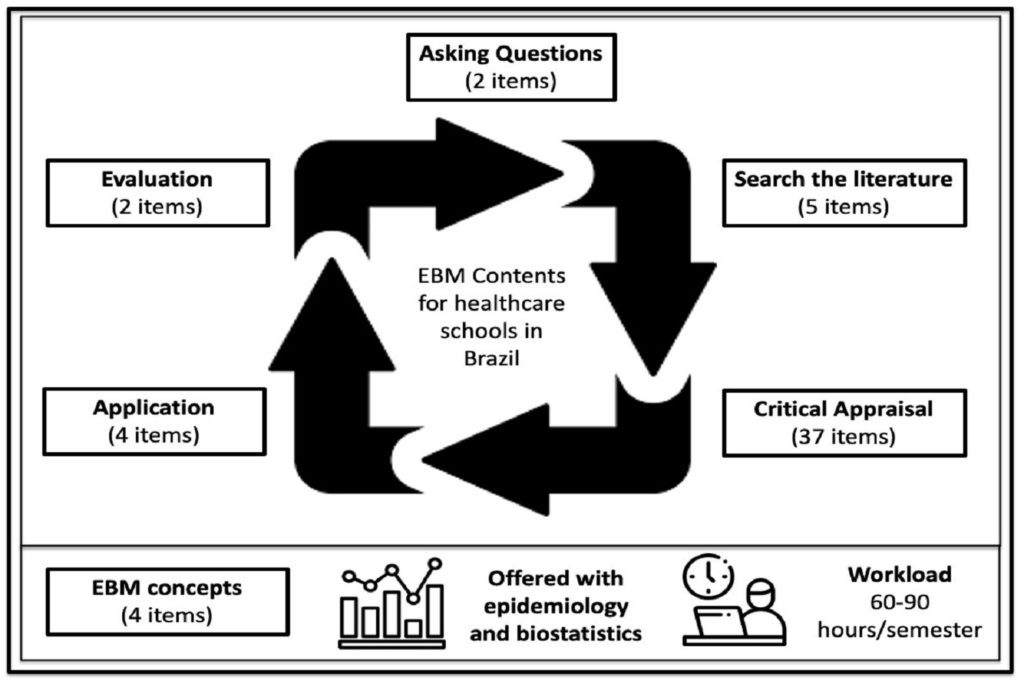Blog entry written on: Consensus on evidence-based medicine curriculum contents for healthcare schools in Brazil, (bmjebm-2020-111397.R1)
Authors: Gabriela Andrade Araujo, Luis Claudio Lemos Correia, Julia Rodrigues Siqueira, Leandro Calazans Nogueira, Ney Meziat-Filho, Leonardo Oliveira Pena Costa, Felipe J Reis
Evidence-Based Medicine (EBM) integrates the best available research evidence with clinical expertise and patient’s unique values and preferences. On one side, health care professionals need to take into account their knowledge, skills and attitudes to develop a focused clinical question, perform an effective search of the literature, critically appraise the evidence, apply to the clinical context and evaluate the effectiveness of the process; on the other side, patients hope that they will receive interventions that had their effectiveness proven through scientific research considering their values and preferences. However, EBM is not widely implemented by healthcare professionals.
Considering that low-value care (i.e., as health services such as tests, procedures and treatments that provide no benefit to patients or can even cause harm) are a problem for all health systems and can be particularly more problematic in countries with low health resources, efforts to develop and implement EBM in all health professional curricula are required. The development of an evidence-based medicine curriculum can be the first step to ensure the quality of health care enabling future health professionals to learn the fundamentals of research and the application of evidence in practice.
In our study Consensus on evidence-based medicine curriculum contents for healthcare schools in Brazil (bmjebm-2020-111397.R1), we used a modified Delphi approach to obtain a final consensus of Brazilian EBM experts. The expert panel was composed of 40 health professionals from different areas including Medicine, Nursing, Physiotherapy, Odontology, Psychology, Nutrition and Exercise and sports science. Most of the panel members were experts in the field of epidemiology, biostatistics and public health. All questions were translated and adapted into Brazilian Portuguese from the consensus on Core Competencies in Evidence-Based Practice for Health Professionals.
The consensus obtained in this study resulted in an EBM curriculum for Brazilian health care schools composed of 54 contents. These 54 contents include introductory EBM concepts (4 items) and contents of the EBM 5-step model as follow: concepts for question (2 items), searching the literature (5 items), critical appraisal (37 items), application (4 items), evaluation (2 items) and additional information (3 items) (Figure 1).
Figure 1. Number of items, prerequisites and workload per semester of the EBM curriculum for Brazilian health care schools
We recognize that the development of a EBM curriculum is part of the solution; however, there are other challenges to overcome. Several studies highlight multiple barriers to implementing EBM by different healthcare professionals including lack of time, inability to comprehend statistical data, lack of employer support, resources, interest and generalisation of the results to the patient, difficulty in obtaining full-text papers and the language of publication. Nevertheless, this is a crucial step to improve the uptake of EBM in our region.
Authors
Felipe J. J. Reis
Professor of Physiotherapy at Instituto Federal do Rio de Janeiro (IFRJ), Rio de Janeiro, Brazil.
Pain in Motion Research Group, Department of Physiotherapy, Human Physiology and Anatomy, Faculty of Physical Education & Physiotherapy, Vrije Universiteit Brussel, Brussels, Belgium.
Conflict of Interest: None to declare.
Julia Rodrigues Siqueira
Physiotherapist – Instituto Federal do Rio de Janeiro (IFRJ), Rio de Janeiro, Brazil
Conflict of Interest: None to declare.
DISCLAIMER
The views and opinions expressed on this site are solely those of the original authors. They do not necessarily represent the views of the BMJ and should not be used to replace medical advice. All information on this blog is for general information, is not peer-reviewed, requires checking with original sources and should not be used to make any decisions about healthcare. No responsibility for its accuracy and correctness is assumed by us, and we disclaim all liability and responsibility arising from any reliance placed on such commentary or content by any user or visitor to the Website, or by anyone who may be informed of any of its content. Any reliance you place on the material posted on this site is therefore strictly at your own risk.


